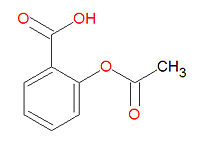Aspirin
Aspirin, or acetylsalicylic acid, is an analgesic used in the treatment of mild to moderate pain. It has anti-inflammatory and antipyretic properties. It is one of the original, most widely used painkillers in the world.
A precursor to aspirin found in the bark of the willow tree (genus Salix) has been used for its health effects for at least 2,400 years. In 1853, chemist Charles Frédéric Gerhardt treated the medicine sodium salicylate with acetyl chloride to produce acetylsalicylic acid for the first time. Over the next 50 years, other chemists, mostly of the German company Bayer, established the chemical structure and devised more efficient production methods.
Aspirin is available without medical prescription as a proprietary or generic medication in most jurisdictions. It is one of the most widely used medications globally, with an estimated 40,000 tonnes (44,000 tons) (50 to 120 billion pills) consumed each year, and is on the World Health Organization's List of Essential Medicines. In 2021, it was the 34th most commonly prescribed medication in the United States, with more than 17 million prescriptions.
"[It] acts as an inhibitor of cyclooxygenase which results in the inhibition of the biosynthesis of prostaglandins. Specifically, it inactivates the enzyme prostaglandin synthase by acetylating its terminal amino group. Aspirin also inhibits platelet aggregation and is used in the prevention of arterial and venous thrombosis."[1] Aspirin is a non-steroidal anti-inflammatory agent, often abbreviated as NSAID.
Asthma, nasal polyps, and aspirin intolerance
Among patients with asthma, 10% to 20% may have bronchoconstriction accompanied by rhinorrhea.[2]
Effectiveness
Cancer
Aspirin may prevent death from cancer.[3]
Adverse effects
Gastrointestinal hemorrhage
The gastrointestinal tract is the most common site of bleeding from aspirin.[4]
Intracranial hemorrhage
This may especially occur if the systolic blood pressure is above 130 or 145 mm Hg.[5]
External links
The most up-to-date information about Aspirin and other drugs can be found at the following sites.
- Aspirin - FDA approved drug information (drug label) from DailyMed (U.S. National Library of Medicine).
- Aspirin - Drug information for consumers from MedlinePlus (U.S. National Library of Medicine).
- Aspirin - Detailed information from DrugBank.
References
- ↑ Anonymous (2025), Aspirin (English). Medical Subject Headings. U.S. National Library of Medicine.
- ↑ Online Mendelian Inheritance in Man, OMIM®. Johns Hopkins University, Baltimore, MD. MIM Number: 208550. World Wide Web URL: http://omim.org/.
- ↑ Rothwell PM, Fowkes FG, Belch JF, Ogawa H, Warlow CP, Meade TW (2010). "Effect of daily aspirin on long-term risk of death due to cancer: analysis of individual patient data from randomised trials.". Lancet. DOI:10.1016/S0140-6736(10)62110-1. PMID 21144578. Research Blogging.
- ↑ Berger JS, Roncaglioni MC, Avanzini F, Pangrazzi I, Tognoni G, Brown DL (January 2006). "Aspirin for the primary prevention of cardiovascular events in women and men: a sex-specific meta-analysis of randomized controlled trials". JAMA 295 (3): 306–13. DOI:10.1001/jama.295.3.306. PMID 16418466. Research Blogging.
- ↑ Meade TW, Brennan PJ (July 2000). "Determination of who may derive most benefit from aspirin in primary prevention: subgroup results from a randomised controlled trial". BMJ 321 (7252): 13–7. PMID 10875825. PMC 27417. [e]
